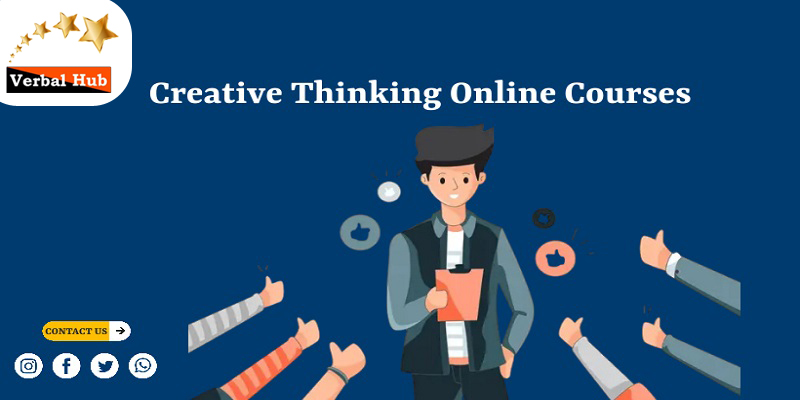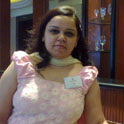VerbalHub’s Creative Thinking Courses
Human beings always aspire for overall growth that comes through creativity, Time management, interpersonal skills, leadership skills, and self confidence. Don’t worry if you consider that you lack these skills, all can be developed through personality development coaching and classes.

Creative Online Course
VerbalHub offers 20 hours of online personality development courses as well as an offline Personality Development course training program to charge you with all the dynamic skills to become a future leader.
The course has been divided into four weeks.
Week 1
1. Introduction of Personality Development.
2. Benefits of Personality Development.
3. Usages of Personality Development.
4. Implementation of Personality Development.
5. Workshop and exam.
Week 2
1. Creativity.
2. How to become creative.
3. How to develop a creative mind.
4. Implementation of creativity.
5. Workshop and exam.
Week 3
1. Communication skills.
2. Interpersonal skills.
3. Time-management.
4. Implementation of time management, communication skills, and interpersonal skills.
5. Workshop and exam.
Week 4
1. Leadership skills
2. Self-confidence
3. Implementation of leadership skills and self confidence
4. Revision of all skills
5. Mocks and interview
Detail of Creative Online Courses.
Creativity begets the productive idea, represent useful concepts, or suggest the best solutions to the problem. This skill makes you able to think innovatively and outside the box, and fix complicated situation.
Creative thinking course will cover the definition of creativity, the creative process, the creative mind, types of creativity, and creative intelligence.
Part 1: Understanding Creativity
Creativity does not only enable to create fresh ideas but also help generating worthy ideas and solution of all problems. It is a process that involves divergent thinking, ideation, and innovation. Creativity can be applied in various domains, including arts, sciences, business, and technology.
Part 2: The Creative Process
The creative process refers to the series of steps that individuals go through to generate and develop creative ideas. The creative process involves four stages:
Preparation: This stage involves gathering information, researching, and identifying the problem or challenge that needs to be solved.
Incubation: This stage involves letting the ideas and information sit in the subconscious mind to generate new connections and insights.
Illumination: This stage involves the "aha" moment, where the creative idea or solution emerges.
Verification: This stage involves testing, refining, and implementing the creative idea or solution.
Part 3: The Creative Mind
The creative mind is characterized by divergent thinking, curiosity, openness to experience, and a willingness to take risks. Creative individuals often have a broad range of interests and are not afraid to challenge the status quo. They are also comfortable with ambiguity and uncertainty and have a strong sense of persistence.
Part 4: Types of Creativity
There are several types of creativity, including:
Artistic Creativity: This involves the ability to create and appreciate art, including music, painting, sculpture, and literature.
Scientific Creativity: This involves the ability to develop new theories, models, and technologies in the sciences.
Business Creativity: This involves the ability to develop new products, services, and business models.
Social Creativity: This involves the ability to develop innovative solutions to social problems and issues.
Part 5: Creative Intelligence
Creative intelligence refers to the ability to solve problems and generate new ideas using creative thinking. It involves a combination of cognitive abilities, such as divergent thinking, critical thinking, and problem-solving skills, as well as personal qualities such as curiosity, persistence, and openness to experience.
Part 6: Strategies for Boosting Creativity
Boosting creativity takes time and effort, but it is a worthwhile investment that can lead to new ideas and solutions. Some strategies for boosting creativity include:
Brainstorming: This involves generating as many ideas as possible without judgment or criticism.
Mind Mapping: This involves creating a visual map of ideas and concepts to explore relationships and connections.
Taking Breaks: Taking breaks from work and engaging in activities that stimulate the mind, such as exercise or hobbies, can help stimulate creativity.
Collaboration: Working with others can bring new perspectives and ideas to the table.
Risk-Taking: Taking calculated risks and stepping out of your comfort zone can help generate new ideas and solutions.
To sum up
Creativity is an essential skill that enables individuals to think outside the box and develop innovative solutions. By understanding the creative process, the creative mind, types of creativity, and creative intelligence, individuals can learn how to harness their creativity and generate new ideas and solutions. By incorporating strategies for boosting creativity into their daily routine, individuals can unlock their creative potential and achieve success in various domains.




